Efren Bata Reyes as Caesar Morales! I chanced upon this article on Efren Bata Reyes, aka The Magician, as I was browsing EasyPoolTutor.com on billiards and Filipino pool players. The article, "8-Ball, Corner Pocket," was written by Phil Zabriskie and published in the December 2001 issue of Time Asia. It is one interesting read, friends! And I kid you not!
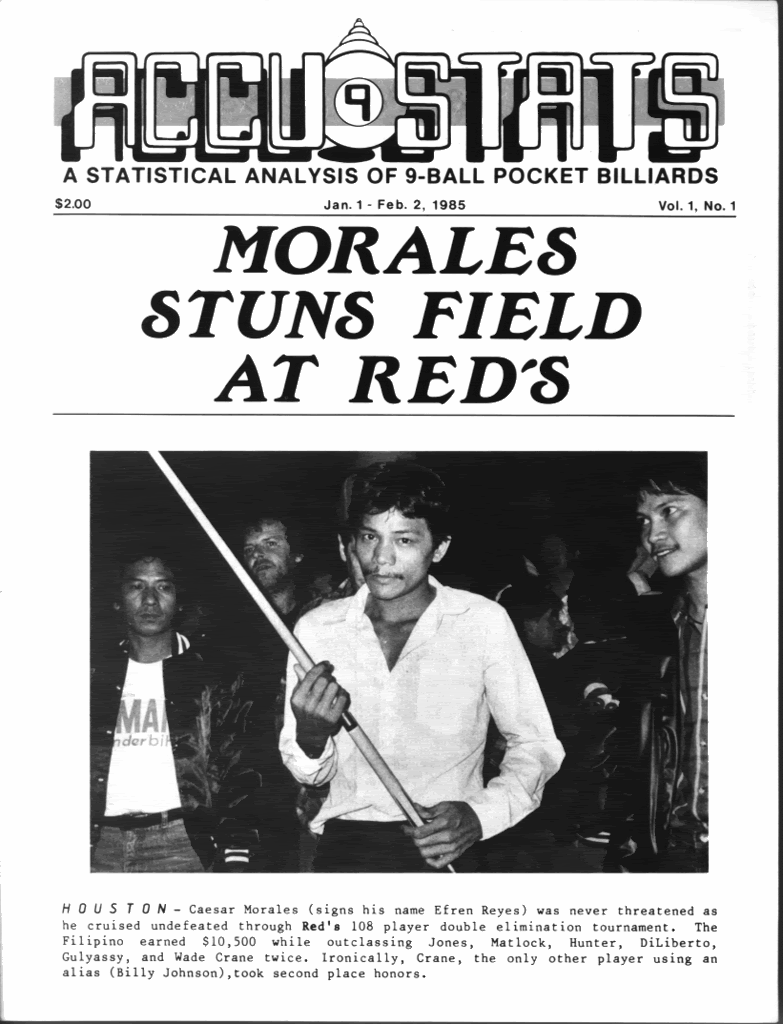 He was a skinny guy with a thin mustache and no teeth. To most folks, this Caesar Morales looked like a dreamer without a chance, some local hero or small-time hustler who thought he could ride a few bar room triumphs to success on the pro billiards circuit. Maybe he was Mexican, or Filipino - he didn't say and no one asked. This was the 1985 Red's 9-Ball Open in Houston, Texas, $10,500 to the winner, where billiards' best came to win, not make friends.
He was a skinny guy with a thin mustache and no teeth. To most folks, this Caesar Morales looked like a dreamer without a chance, some local hero or small-time hustler who thought he could ride a few bar room triumphs to success on the pro billiards circuit. Maybe he was Mexican, or Filipino - he didn't say and no one asked. This was the 1985 Red's 9-Ball Open in Houston, Texas, $10,500 to the winner, where billiards' best came to win, not make friends.
Morales stayed inconspicuous; the guys he came with did not. They were making bets, saying not only would Morales and his $10 cue win his matches, but he would beat the finest shot makers and gamblers in the country by two, three or four racks, in a race to 11. Ludicrous. No rookie no-name could pull that off. Besides, pool was an American game. Sure there were good players from Europe, Japan and Taiwan, and there was a sportswriter, John Grissim, who'd been to the Philippines and claimed there were guys in that country, like a kid named Efren Reyes, who could beat anyone anywhere. But the Americans were still dominant. And yet Morales' buddies were throwing out crazy odds, "giving three or four games on the wire," recalls former pro player and promoter Jay Helfert. "The top American players didn't have to win the match, all they had to do was win seven games. Everybody was jumping on it, betting thousands of dollars. And he was beating player after player 11-3, 11-2, 11-4. I said, 'Who is this guy?'"
This guy won the tournament. And he cleaned up in the back room, during the big-money action that starts when the crowds go home. Before the fans left, though, the mystery shark signed a few autographs. Only then did he reveal himself, signing not Caesar Morales, but his real name, Efren Reyes.
Nita's carinderia is a modest little place on a side street in Angeles City, a dust-choked town two hours north of Manila. It's basically one long room, sparse and blue-walled, with an eating, drinking and tale swapping area up front and two pool tables in back. On an early November weekday, Reyes stands by a life-size cutout of himself hawking San Miguel beer. He bought this place from a friend, the real Caesar Morales, and gave it to Nita, his sister. He's older now, of course, a bit wider around the middle. In jeans and a green polo shirt, a towel over his shoulder, he casually works the table under the gaze of an early afternoon clientele watching perhaps the world's greatest billiards player.
In the Philippines, Efren is known simply as "The Magician," or "Bata," Tagalog for "Kid." Since revealing himself in Texas, Reyes has toured the world, winning, dazz-ling, realigning the game's balance of power and becoming his country's sole bona fide international sports superstar. Efren's exploits are like possessions, bundled up by his countrymen as stories to be shared or traded. The government awarded him the Philippine Legion of Honor in 1999 and his face, along with President Gloria Macapagal Arroyo's, greets arrivals at Manila's airport. Pool cues have became a hot accessory and new halls have sprouted everywhere. "The Philippines is in search of heroes in the international scene," says Aristeo Puyat, co-owner of Puyat Sports, which sponsors Reyes. "The Olympics are a debacle; we never win a medal. Even in the Asian Games we have a hard time. But here, we have a champion."
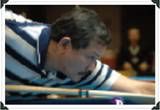 There's no centralized billiards body, there are no formal international rankings. But Reyes is indeed the guy everybody in the game wants to beat. Many end up handing him wads of $100 bills. "There are just things he does on a pool table that are a little bit above everybody else," says Helfert. He can play angles and the rails. He can position the cue ball seemingly at will, he excels at the safety game, burying opponents behind balls to prevent a clean shot, and he takes, and often makes, shots others don't see or won't risk. After Houston, he won American tournaments in several different categories, nine ball, straight pool, rotation, one pocket, carom billiards, and two Southeast Asian Games gold medals in 1987. In 1995, he was Billiards Digest's Player of the Year. In 1997, he survived a three-day, $100,000 race to 120 in Hong Kong billed "The Color of Money I" against top American Earl Strickland, winning 120-117 and collecting $75,000 (less a $10,000 winner-to-loser payment he and Strickland agreed to before the match). A year earlier in Reno, Nevada, again facing Strickland, he had produced one of the most memorable shots on record. "Earl left him on the end rail totally tied up behind the nine ball," recalls Helfert, the tournament director. "It looked like there was no possible way for him to hit the object ball, which I think was the eight. Efren looked at it for a while, then he kicked the cue two rails back and forth across the table, hit the edge of the eight, made the eight, got position on the nine and ran out and won the match. It's by far the most amazing win I've ever seen. Very few players could have hit the ball."
There's no centralized billiards body, there are no formal international rankings. But Reyes is indeed the guy everybody in the game wants to beat. Many end up handing him wads of $100 bills. "There are just things he does on a pool table that are a little bit above everybody else," says Helfert. He can play angles and the rails. He can position the cue ball seemingly at will, he excels at the safety game, burying opponents behind balls to prevent a clean shot, and he takes, and often makes, shots others don't see or won't risk. After Houston, he won American tournaments in several different categories, nine ball, straight pool, rotation, one pocket, carom billiards, and two Southeast Asian Games gold medals in 1987. In 1995, he was Billiards Digest's Player of the Year. In 1997, he survived a three-day, $100,000 race to 120 in Hong Kong billed "The Color of Money I" against top American Earl Strickland, winning 120-117 and collecting $75,000 (less a $10,000 winner-to-loser payment he and Strickland agreed to before the match). A year earlier in Reno, Nevada, again facing Strickland, he had produced one of the most memorable shots on record. "Earl left him on the end rail totally tied up behind the nine ball," recalls Helfert, the tournament director. "It looked like there was no possible way for him to hit the object ball, which I think was the eight. Efren looked at it for a while, then he kicked the cue two rails back and forth across the table, hit the edge of the eight, made the eight, got position on the nine and ran out and won the match. It's by far the most amazing win I've ever seen. Very few players could have hit the ball."
Already a folk hero, Reyes became a legend at the 1999 World Championships in Cardiff, Wales. As is his custom, he showered before the tournament and not again until it was over" so the luck won't wash off," he says, then beat players from England, Germany, Japan, fellow Filipino Francisco ("Django") Bustamante and, in the finals, Taiwan's Hao Ping-chang. Filipinos knew he was good, even great. But now he was world champion, and he was theirs.
At Nita's, Reyes spends about 20 minutes on the table before unscrewing his cue. He wipes his brow, then begins cataloging the aches and pains that are chipping away at his game. His eyes have gotten worse, he says. His elbows and shoulders hurt, and his belly makes it harder to stretch across the table. Everything has gotten worse since he quit smoking in 1997, he says. Some people in the Philippines say age has caught up with Reyes and robbed him of his magic touch. Reyes seems to agree. He thinks he'll play five more years, then retire, give lessons, make appearances or open his own hall. He knows other players are gaining on him, and that some may be, right now, better. He takes a shot, misses, and a grimace flashes across his face. "I know every angle," he says, "but sometimes I aim here" he points to one side of the ball "and I hit here," millimeters away. Puyat says Reyes "misses shots you'd never imagine his missing 10 years ago." Reyes shrugs, unmoved, but then, with rare emotion: "They can beat me now, but they can never achieve what I've achieved."
But just days before this catalogue of woes, Reyes was in Manila taking on Jeanette Lee, the most lucratively endorsed female in the game, nicknamed "The Black Widow" for her glamorous all-black outfits. The sellout crowd hooted and howled, thrilled to see both their hero and his striking challenger. The match started out close, but Reyes pulled away, winning nine of the last 10 games and the match, 13-5. After receiving his oversized check for $10,000 (Lee got $5,000), he was besieged by fans holding out T shirts, scraps of paper and pool cues for him to sign. Lee, downstairs at a reception, proclaimed: "He truly is the greatest player that ever lived."
When he started, Reyes stood on cases of Coke so he could reach the table. His family was poor. For a time, Reyes lived with an uncle who ran the Lucky 13 pool hall in Manila, occasionally sleeping on one of the tables, dreaming, he says, of how to handle the cue. When he was nine, he saw a man beat another man and get paid cash, and he saw his future. He played wherever, whenever, at the Lucky 13 or Rommel's in Manila, the Olympic or City Lanes in Angeles. Classmates, Chinese kids mostly, staked him in challenge matches. He attracted more backers, older guys who would whisk him from the school steps to billiards halls or girlie bars and watch him empty local and G.I. wallets until 5 a.m. School? "I went so I could sleep," he says. He dropped out when he was 15, a decision his parents accepted after he started adding his winnings to what his father earned as a vendor. At that stage, he didn't seek out top players because they were harder to beat; his ambition was to get paid, not to be the best. But to get paid the big money, he soon had to play the best.
There's a distinct Filipino style of billiards, says Helfert, "flowery," with a lot of movement in the backswing. More crucially, observes Billiards Digest editor Kirstin Pires: "The Filipinos are great gamblers. They always play their best when there is winner-take-all money." In tournaments, consolation money is still a payday. But when $10,000 or $20,000 is on the table, and only one man can take it home that's why it's gambling they find that additional motivation provides a little extra focus.
"No one in the world can stay with him hour after hour," says George Breedlove, a former top player. Backers still put up the money, Reyes still gets his cut, but the stakes have grown. Three years ago, legendary gambler and professional poker player T.A. Preston Jr., a.k.a. "Amarillo Slim," was in a Dallas pool hall. Slim didn't play much anymore. He was just watching, until a matchmaker told him Reyes would spot him 15-5 in one pocket, best of seven: each player could use one pocket on the table, and Reyes was claiming that in each game he'd sink 15 balls before Slim sank five. "I don't think that person lives," Slim said, taking the bet. He lost, returning the next day with "enough $100 bills to burn down the block." He lost again. He says he left $200,000 with Reyes and his backers. The next week, in California, "He wound up playing me 17-5. At 17-5, I beat him," Slim says (they ended even). "He's a great money player. I never saw him rattled, never saw him harass his opponent. Every time we played, he was a perfect gentleman. And every time, he did things I've never seen anyone do before."
At dinner, Reyes ignores his aches and pains and concentrates instead on the food, fish and rice, one light beer, the friends (all men) he's assembled around him, and, later at a karaoke bar, the lyrics to Before You Go by Matt Munro and Englebert Humperdink's The Way It Used to Be. That weekend, he took his bad eyes and bad elbows to the Tokyo-9 Ball Tournament and won the most lucrative event in the sport, pocketing about $160,000. The following weekend, he won again, this time in Warsaw, Poland. Still, he continues to say that his time at the top might be coming to an end, that he should prepare the country for the day he can no longer be the player they want, and maybe need him to be. During the late '80s and early '90s, when he went through a title drought, he felt the pressure. "Everyone in the Philippines expects me to win. They think I should never lose."
Pool is a game of positioning: you shoot to sink when you can and play safety when you must, and the hustle is always on. Reyes lives as he plays, staying home, safe, when he's not playing, decrying his sad slide, then going to Tokyo or Wales or Reno when there's money on the table. The last time we meet, at Nita's, he answers questions, poses for pictures, but he's clearly ready to do something else. What exactly, he doesn't know. Maybe wander around town, he says, and look for a game.
"The Anitokid loves billiards!"
*Did you enjoy the post? Did you find it interesting?
You know what to do...:)

 He was a skinny guy with a thin mustache and no teeth. To most folks, this Caesar Morales looked like a dreamer without a chance, some local hero or small-time hustler who thought he could ride a few bar room triumphs to success on the pro billiards circuit. Maybe he was Mexican, or Filipino - he didn't say and no one asked. This was the 1985 Red's 9-Ball Open in
He was a skinny guy with a thin mustache and no teeth. To most folks, this Caesar Morales looked like a dreamer without a chance, some local hero or small-time hustler who thought he could ride a few bar room triumphs to success on the pro billiards circuit. Maybe he was Mexican, or Filipino - he didn't say and no one asked. This was the 1985 Red's 9-Ball Open in  There's no centralized billiards body, there are no formal international rankings. But Reyes is indeed the guy everybody in the game wants to beat. Many end up handing him wads of $100 bills. "There are just things he does on a pool table that are a little bit above everybody else," says Helfert. He can play angles and the rails. He can position the cue ball seemingly at will, he excels at the safety game, burying opponents behind balls to prevent a clean shot, and he takes, and often makes, shots others don't see or won't risk. After
There's no centralized billiards body, there are no formal international rankings. But Reyes is indeed the guy everybody in the game wants to beat. Many end up handing him wads of $100 bills. "There are just things he does on a pool table that are a little bit above everybody else," says Helfert. He can play angles and the rails. He can position the cue ball seemingly at will, he excels at the safety game, burying opponents behind balls to prevent a clean shot, and he takes, and often makes, shots others don't see or won't risk. After 





















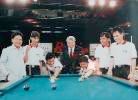
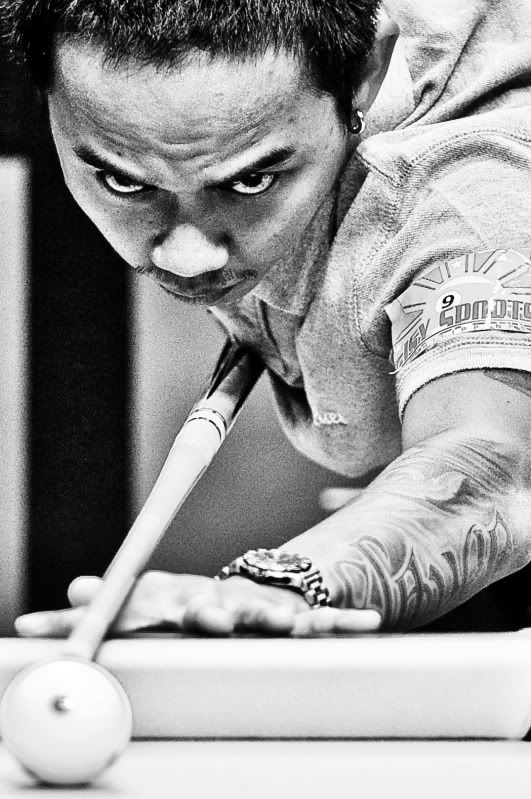

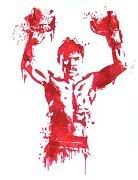













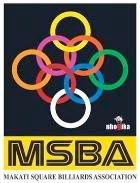
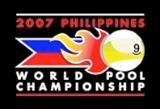

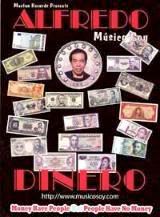
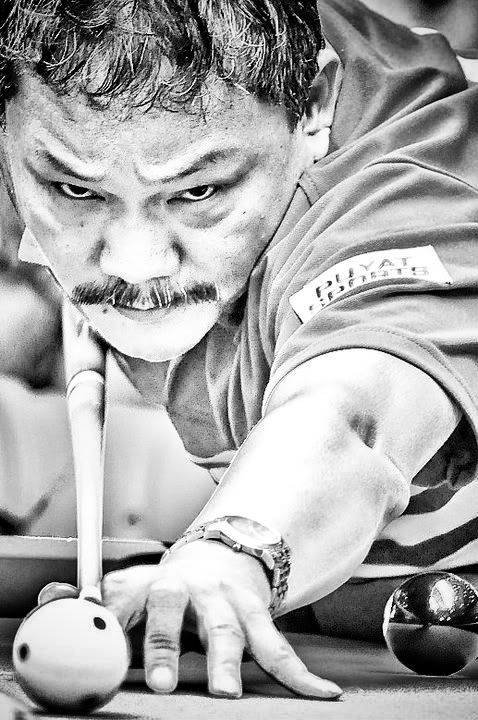





4 comments:
oo great articles ;)
Thanks, buddy!
:)
hats off to "the magician"!
hats off to "the magician"!
Post a Comment